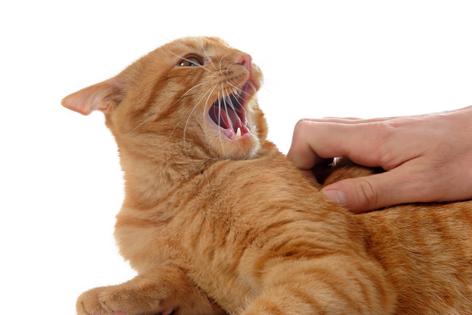My Pet World: A seven-year-old cat suddenly shows signs of aggression
Dear Cathy,
I have a seven-year-old male mixed tabby cat named Sam that I have had since he was five months old. He is neutered. For the past two to three months, he has started biting me after being in “lovey mode,” where he purrs and rubs against my head, neck, face, or chest. These attacks seem to be happening more and more often these days. He mostly lays around the house and occasionally plays.
Then, out of the blue, he will launch himself directly at me and bite down hard, and boy, does it hurt. Sometimes, he will dig his claws in me as well. I have tried spraying him, yelling "no," and batting him away, but nothing works. Also, I usually never know when he'll do this, so I don't always have a spray bottle near me. Sometimes, he is biting so hard that it's difficult to get him to let go without making him think we're playing. Is this something I need to address with a vet?
— Caitlin, St. Louis, Missouri
Dear Caitlin,
Yes, a medical exam is essential for all aggressive cats – especially cats who have not displayed this behavior before and who are suddenly doing it at seven years old. I know from experience that getting bitten by an aggressively behaving cat can be very painful.
There are many reasons cats can be aggressive that need to be considered. Pet-induced aggression is relatively common and occurs when repeated petting arouses, irritates, or excites them in some way. They bite or swat you to tell you they have had enough. In these situations, you must learn how many strokes it takes to trigger the behavior and keep your contact with him under that limit at all times.
Redirected aggression is where an external stimulus causes him to lash out at the nearest bystander because he can’t get to the source of his agitation. An example of this would be your cat seeing another cat outside and then turning and expressing his frustration toward you with an unexpected swat or bite.
However, since he didn't behave like this as a kitten and has only been doing it for a few months, I would be concerned it's a physical or mental health condition, like thyroid or orthopedic problems, adrenal dysfunction, cognitive dysfunction, or neurological disorders, to name a few. Even food or medication can cause aggression issues.
So, please take Sam to the vet for a thorough exam to see what is going on. The sudden onset seems to point to a health problem, but if the doctor thinks it's a behavioral problem, he can prescribe medication and recommend a behavior specialist for a consultation.
Dear Cathy,
I just read the question from the owner of a senior dog who needs a dental cleaning. She was concerned about the pup undergoing anesthesia. There are dental practices that clean dogs' teeth without anesthesia by trained vet techs, literally lulling them into a state of relaxation by swaddling them. I couldn't believe they could do that, especially to one of my dogs, but it worked like a charm.
I have successfully used this practice twice with both of my dogs. It should be noted that they don't deal with chipped, rotten, or broken teeth, just teeth cleaning. I hope this information helps Katherine from Tulsa, Oklahoma, and other dog owners.
— Susan, Severna Park, Maryland
Dear Susan,
Traditionally, our pets are put under anesthesia to have their teeth cleaned, so I found your letter about this new treatment interesting and not one I had heard of before. So, I looked into this topic and found out that some dental practices around the country offer these "low-stress, holistic, anesthesia-free" teeth cleanings. They describe swaddling small dogs and cats, much like you would a baby, and offering some sort of looser wrap for larger dogs, to keep them calm. Then the vet or vet tech gently opens their mouths to scrape their teeth clean.
Some vets debate whether you can clean a pet's teeth well enough this way. From the websites I saw, however, the clinics offering this service clearly state that these cleanings are for preventative care and would not be a good option for pets with severe periodontal problems.
It doesn't look like this service is offered everywhere in the U.S. yet. Still, Katherine from Tulsa can do an online search for "calming techniques for non-anesthetic pet dental care" to see if she can find a veterinary clinic near her that offers this service. It sounds like a nice option for getting their teeth cleaned more frequently.
========
(Cathy M. Rosenthal is a longtime animal advocate, author, columnist and pet expert who has more than 25 years in the animal welfare field. Send your pet questions, stories and tips to cathy@petpundit.com. Please include your name, city, and state. You can follow her @cathymrosenthal.)
©2022 Tribune Content Agency, LLC.
(c) 2022 DISTRIBUTED BY TRIBUNE MEDIA SERVICES, INC.










